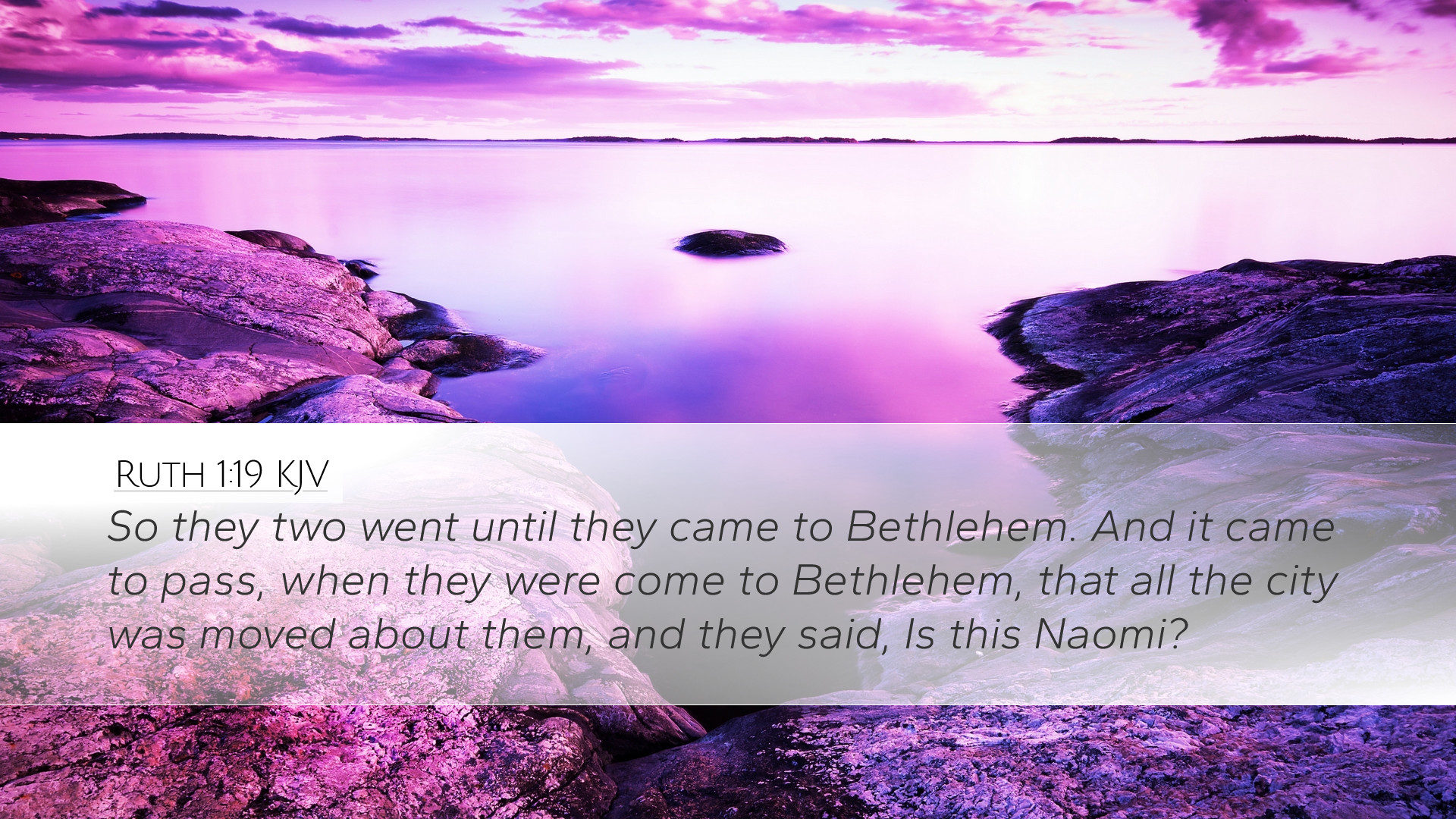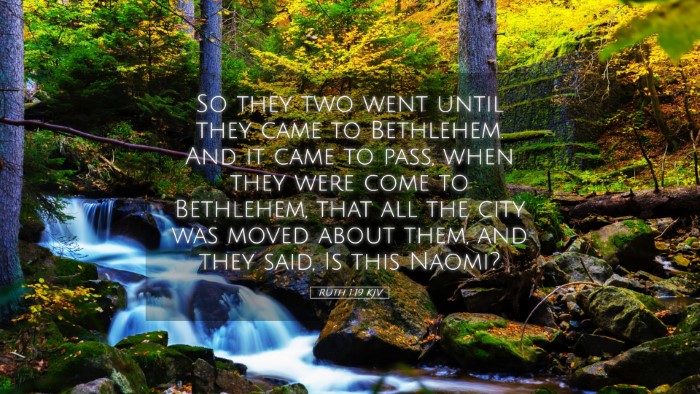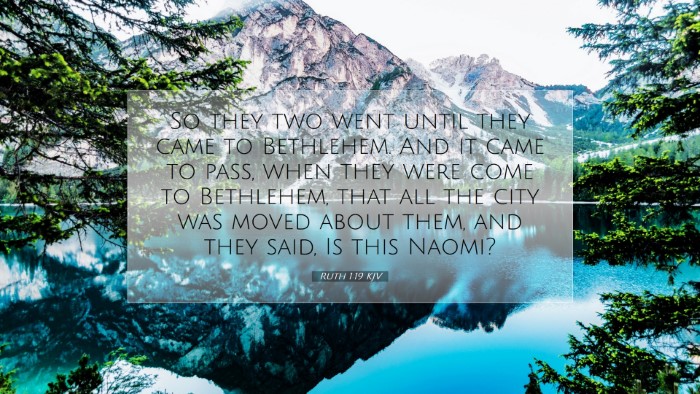Old Testament
Genesis Exodus Leviticus Numbers Deuteronomy Joshua Judges Ruth 1 Samuel 2 Samuel 1 Kings 2 Kings 1 Chronicles 2 Chronicles Ezra Nehemiah Esther Job Psalms Proverbs Ecclesiastes Song of Solomon Isaiah Jeremiah Lamentations Ezekiel Daniel Hosea Joel Amos Obadiah Jonah Micah Nahum Habakkuk Zephaniah Haggai Zechariah MalachiRuth 1:19
Ruth 1:19 KJV
So they two went until they came to Bethlehem. And it came to pass, when they were come to Bethlehem, that all the city was moved about them, and they said, Is this Naomi?
Ruth 1:19 Bible Commentary
Commentary on Ruth 1:19
Verse Context: Ruth 1:19 states: "So the two women went on until they came to Bethlehem. And when they had arrived in Bethlehem, the whole town was stirred because of them; and the women said, Is this Naomi?" This verse marks a significant moment in the narrative, as Naomi returns to Bethlehem after a long absence, accompanied by Ruth.
Overview of Ruth 1:19
This verse is crucial because it sets the stage for the events that will follow, focusing on Naomi's return and the reactions of the townspeople. It highlights themes of loss, identity, and community, and prepares the reader for the unfolding story of redemption.
The Significance of the Journey
The journey of Naomi and Ruth from Moab to Bethlehem is enriched with meaning. As Matthew Henry notes, it reflects a physical and spiritual pilgrimage back to the covenant community. The two women symbolize the choice to return to God's promises, as Naomi heard that "the Lord had visited his people" (Ruth 1:6).
Matthew Henry emphasizes:
- Their journey signifies repentance and a desire to seek God's providence.
- Ruth’s commitment to Naomi illustrates the essential bond of loyalty and devotion that transcends cultural boundaries.
The Community's Reaction
Upon their arrival, the town's stirring reaction signifies how connected the community is to its members. Albert Barnes points out that the people of Bethlehem were surprised to see Naomi return, questioning her identity with the phrase, "Is this Naomi?" This moment captures not only the physical changes that may have occurred in Naomi but also the emotional and spiritual toll of her journey.
Key Observations include:
- The change in Naomi's appearance and demeanor reflects her suffering during her absence.
- The communal response indicates that Naomi's previous life had deeply impacted the community, illustrating an essential aspect of social and spiritual belonging.
Naomi's Identity Crisis
Naomi’s change in identity is profound. She has lost her husband and sons, which leads her to declare in Ruth 1:20-21 that she should be called Mara, meaning "bitter.” Adam Clarke analyzes this deep sense of loss and despair, suggesting that it highlights the impact suffering can have on one’s identity and perception. It reflects not only personal trauma but also a broader theological reflection on the nature of God’s providence during times of distress.
Clarke's Insights include:
- The naming of Mara signifies the brokenness of Naomi’s spirit and the perceived withdrawal of God's favor.
- However, her return implies a glimmer of hope that God's mercy and provision could still be active in her life.
Theological Implications
Ruth 1:19 acts as a lens through which to explore God's faithfulness in calamity. The city of Bethlehem—known for being the birthplace of David and, later, Jesus—foreshadows redemption. Throughout history, God shows His covenant faithfulness during difficult times. The return of Naomi with Ruth not only signifies personal restoration but also the unfolding of redemption for the nation of Israel.
Biblical Theologians Reflect:
- Matthew Henry reflects on God's providential care, positing that every return to Him must be marked by humility and repentance.
- Barnes elucidates that Ruth’s loyalty serves as a paradigm of faithfulness that could be emblematic of future generations seeking God’s will.
- Clarke encourages understanding that while Naomi may feel abandoned, God is setting the stage for her restoration, paralleling the story of Israel.
Application for Today’s Believers
The integration of personal struggle within community life is a vital lesson from this verse. The question "Is this Naomi?" provokes introspection in readers about their sense of identity in times of distress. Moreover, believers today are encouraged to remain committed in their relationships, much like Ruth, even in times of great trial.
Points for Pastoral Reflection:
- Incorporate the themes of loyalty and community support in ministry practices.
- Encourage congregants to share their stories of return and recovery, highlighting God’s enduring faithfulness.
- Teach on the importance of identity in Christ, using Naomi’s return as an example of finding new life within God’s family.
Conclusion
Ruth 1:19 invites profound engagement with the themes of loss, community, and the faithfulness of God. The interplay of Naomi and Ruth’s relationship illustrates the transformative power of loyalty and love in the face of adversity. As believers immerse themselves in this narrative, they find not only the story of two women returning home but also the overarching storyline of God's relentless kindness and redemptive plan for humanity.


